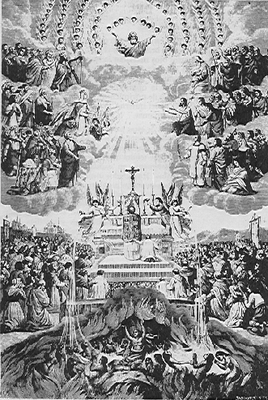
Of all sacraments, the Eucharist (the central act of Catholic worship, known also as the Mass) is the most important.
According to the Second Vatican Council, the Eucharist is "the summit toward which the activity of the church is directed; at the same time it is the fountain from which all its power flows."
In Catholic teaching, a sacrament not only visibly signifies the invisible active present of God, which is also called grace, a sacrament actually causes what it signifies.
The word grace means 'gift' or 'favour'. The 'gift' is God and the 'favour' is eternal life. In fact, the grace of a sacrament is always given unless the recipient is in the state of mortal sin.
As causes of grace, sacraments mediate between God and humanity. A sacrament brings God to people, and people to God. God acts in the sacraments to communicate divine life, or grace; people act in the sacraments to express their adoration, thanksgiving, sorrow for sin, and their needs and hopes.

The Mass
From the earlier years the Eucharist was celebrated on Sunday, as a commemoration of the Resurrection. At the centre of the Mass is the prayer of thanksgiving, once called the Canon Of the Mass and now Known as the Eucharistic Prayer. It is during this prayer that the bread and wine are consecrated by the priest and become the body and blood of Jesus Christ, to be received by the faithful in Holy Communion. The other parts of the mass are largely a vestige of the old synagogue service.
On entering the church it is traditional to dip the hand in the font or Holy water and make the sign of the cross over one's body. It is a symbolic cleansing that helps prepare one for the mass by marking the passage from the secular world to the sacred, and actually washing one's hands and face was once the custom. After purifying themselves with Holy water, Catholics genuflect in the aisle before kneeling in prayer and then sitting down.
The Liturgy of the Word and the Liturgy of the Eucharist are the 2 main parts of every mass.
The Liturgy of the word begins with a reading from the Old Testament and a prayer from the psalms , followed by a reading from the letters of St. Paul or the apostles, a reading from the Gospel, and a homily or sermon.
The Liturgy of the Eucharist begins with the presentation of the gifts through the processional and is followed by the Eucharistic Prayer, and finally, the celebration of communion.
The gifts - unconsecrated communion hosts, water, wine and money from the collection - are carried from the back of the church to the altar in the processional.
No comments:
Post a Comment